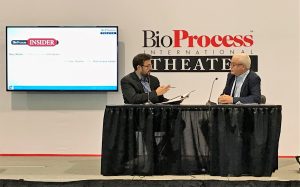With the UK leaving the European Union and the US cutting its corporate tax rates, the changing business landscape holds both opportunities and challenges for Ireland’s life sciences sector.
For decades, Ireland has cemented itself as a major pharma and biopharma manufacturing hub, spurred by low corporate tax rates, and a highly skilled workforce. Its language, proximity to Europe and its membership of the common market have also boosted multinational investment.
On the other side of the Irish Sea, the results of a controversial referendum taken in 2016 means the UK is set to leave the European Union next year. Brexit has been predicted to stall investment in the UK, and the uncertainty has already seen firms either pulling projects or looking at alternative ways to access the common market. It has also led to the planned relocation of the European Medicines Agency (EMA) from London to Amsterdam, The Netherlands.

IDA’s Rory Mullen spoke as part of the Insider Daily series at BIO 2018
Rory Mullen, VP in IDA Ireland’s Life Sciences sector, expressed his regret towards the UK’s decision but said Britain’s loss could turn out to be Ireland’s gains.
“The UK is our closest ally and our biggest partner in Europe and we’re very sorry to see them leave the European Union. On most issues, we’re on the same side of the table with the UK and we would very much prefer if they would reconsider their decision on that and remain an integral part of perhaps a reformed EU,” he told BioProcess Insider, as part of the BPI Theater at BIO in June.
The prospect of Brexit has already created several investments for Ireland in the pharma sector, something Mullen said will continue going forward as firms working within “regulated industries, where companies need absolute certainty as to their capability to provide services across the EU,” look to secure access to the common market.
“We’ve seen a lot of [opportunities from] UK centric service providers, CDMOs, and packagers. There has been announced investments from PCI services in Drogheda; Almac, the large northern Ireland CDMO which is part of the UK has opened a sister site now in Dundalk, south of the border; Wasdell, one of the largest independent secondary packagers, again who are UK centric are now opening a site in Ireland.”
Ireland to ‘Sharpen its Pencil’
As opportunity knocks from Brexit, Mullen remained more cautious as to events in the US, where the corporate tax rate has been cut in efforts to reinvigorate domestic manufacturing, challenging Ireland low rate of 12.5%.
“We’re seeing the US maybe feature where it didn’t really before. We’re going to have to sharpen our pencil to ensure that we can compete.”
Last year, Eli Lilly stalled plans to expand a facility in Kinsale, County Cork, driving fears Ireland had fallen victim to a preference for Donald Trump’s ‘America First’ policy.
But Lilly eventually approved its Irish expansion, and investment has continued to pour into Ireland. Mullen cited multi-million dollar projects by Takeda, WuXi Biologics and MSD (known as Merck & Co. in North America) as all being post-US tax cut investments.
“I think they demonstrate that we still are competitive and tax is a part of the value proposition but it is only part,” he said.
“It is the business-friendly environment, availability of people, and people who are the heads of manufacturing, the heads of tech and the heads of policy are very happy to establish an operation [in Ireland].”
